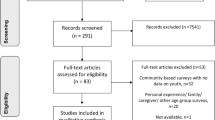Abstract
Stigma in mental illness is a problem fueled by misrepresentation by the media and the assimilation of parent opinion, noted in those as young as six years old. Intervening in adolescence is critical given juxtaposition of increased judgement/fear of judgement and the onset of serious mental illness. This paper details the efforts of an intervention designed to specifically target the perception of dangerousness, social distancing, and use of stigmatizing language. A total of 124 high school freshman participated in the interactive presentation delivered over the course of a typical 40 min class period. An identical survey with a 5-point Likert scale was administered before and after to measure level of agreement with stigmatizing statements. Most participants reported prior exposure through the media (86.6%) and through conversations with family/friends (67.7%). Post intervention, improvement was seen in the perception of dangerousness (MD = 0.45, t = 4.435, p = <0.001), the need for social distancing (measure 1: MD = 0.148, t = 1.785, p = 0.039; measure 2: MD = 0.142, t = 1.773, p = 0.04), and understanding of the experience of those with serious mental illness (MD = 0.377, t = 3.378, p = <0.001). No significant difference was seen in terms of stigmatizing language use (MD = 0.114, t = 1.192, p = 0.118). This study supports the delivery of anti-stigma education to adolescents that avoids the biogenetic and contact approaches, embraces the continuum model of mental health, normalizes psychotic experiences, addresses dangerousness with data, identifies prominent figures with mental illness, and uses personalized statistics to demonstrate why this topic is of importance.



Similar content being viewed by others
References
Mannarini S, Rossi A. Assessing mental illness stigma: A complex issue. Vol. 9, Frontiers in Psychology. 2019.
Kaushik A, Kostaki E, Kyriakopoulos M. The stigma of mental illness in children and adolescents: A systematic review. Vol. 243, Psychiatry Research. 2016. p. 469–94.
The Lancet Psychiatry. #IAmNotDangerous and the politics of stigma. The Lancet Psychiatry. 2019.
Ross AM, Morgan AJ, Jorm AF, Reavley NJ. A systematic review of the impact of media reports of severe mental illness on stigma and discrimination, and interventions that aim to mitigate any adverse impact. Social Psychiatry and Psychiatric Epidemiology. 2019.
Corrigan PW, Morris SB, Michaels PJ, Rafacz JD, Rüsch N. Challenging the public stigma of mental illness: A meta-analysis of outcome studies. Vol. 63, Psychiatric Services. 2012. p. 963–73.
Lannin DG, Vogel DL, Brenner RE, Abraham WT, Heath PJ. Does self-stigma reduce the probability of seeking mental health information? J Couns Psychol. 2016;63(3):351–8.
Chisholm K, Patterson P, Torgerson C, Turner E, Jenkinson D, Birchwood M. Impact of contact on adolescents’ mental health literacy and stigma: The schoolspace cluster randomised controlled trial. BMJ Open. 2016;6(2).
Schnyder N, Panczak R, Groth N, Schultze-Lutter F. Association between mental health-related stigma and active help-seeking: Systematic review and meta-analysis. Vol. 210, British Journal of Psychiatry. 2017. p. 261–8.
Bulanda JJ, Bruhn C, Byro-Johnson T, Zentmyer M. Addressing mental health stigma among young adolescents: evaluation of a youth-led approach. Heal Soc Work. 2014;39(2):73–80.
Watson AC, Miller FE, Lyons JS. Adolescent attitudes toward serious mental illness. J Nerv Ment Dis. 2005;193:769–72.
Weisman HL, Kia-Keating M, Lippincott A, Taylor Z, Zheng J. Mental health stigma prevention: pilot testing a novel, language arts curriculum-based approach for youth. J Sch Health. 2016;86(10):709–16.
Schomerus G, Angermeyer MC, Baumeister SE, Stolzenburg S, Link BG, Phelan JC. An online intervention using information on the mental health-mental illness continuum to reduce stigma. Eur Psychiatry. 2016;32:21–7.
Garrett M, Stone D, Turkington D. Normalizing psychotic symptoms. Psychol Psychother Theory Res Pract. 2006;79(4):595–610.
Author information
Authors and Affiliations
Corresponding author
Additional information
Publisher’s Note
Springer Nature remains neutral with regard to jurisdictional claims in published maps and institutional affiliations.
Rights and permissions
About this article
Cite this article
Dillinger, R.L. Addressing the Stigma Surrounding Serious Mental Illness in Adolescents: a Brief Intervention. Psychiatr Q 92, 161–167 (2021). https://doi.org/10.1007/s11126-020-09787-6
Published:
Issue Date:
DOI: https://doi.org/10.1007/s11126-020-09787-6




